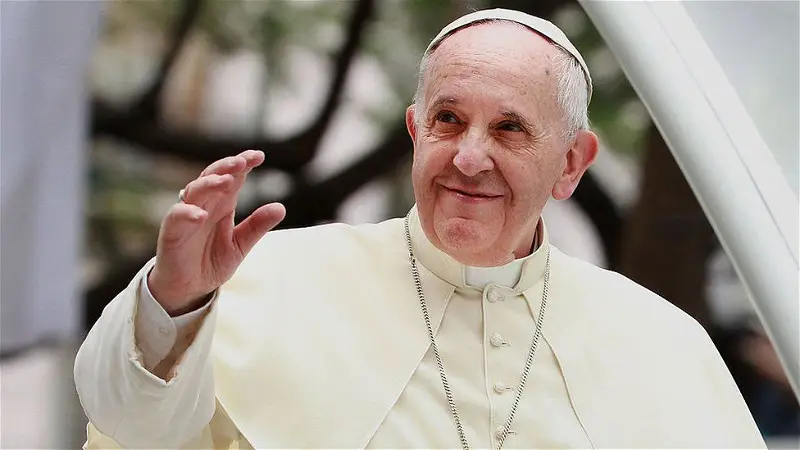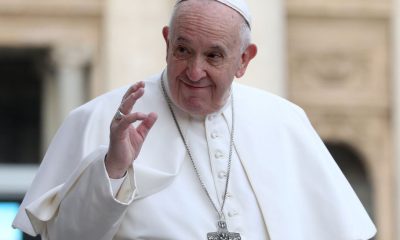More News
30 Untold Facts About Late Pope Francis
By Gideon Ayeni

Pope Francis, the first Latin American pope and a revolutionary figure in the modern Catholic Church, died on Monday at the age of 88 — just a day after making a heartfelt appearance during Easter Sunday celebrations at Saint Peter’s Square.
The Vatican confirmed that he passed away peacefully at 7:35 a.m. following complications from a prolonged respiratory illness linked to thrombocytopenia.
“With profound sadness, I announce the passing of our Holy Father, Pope Francis,” Cardinal Kevin Farrell said in a statement on the Vatican’s official Telegram channel. “His life was wholly devoted to serving God and the Church.”
Pope Francis, born Jorge Mario Bergoglio, leaves behind a legacy defined by humility, simplicity, and deep concern for the poor and marginalized. Here are key things to know about the life and times of the late pontiff:
- Born in Buenos Aires in 1936
Jorge Mario Bergoglio was born on December 17, 1936, in the working-class neighborhood of Flores, Buenos Aires. He was the eldest of five children in a devout Catholic family of Italian descent. - Son of Italian Immigrants
His father, Mario José Bergoglio, fled fascist Italy in 1929 and worked as an accountant in Argentina. His mother, Regina María Sívori, was also of Italian heritage. Their cultural roots and Catholic faith deeply shaped Bergoglio’s worldview. - Humble Beginnings
Raised in modest conditions, Bergoglio developed an early empathy for the struggles of ordinary people — a value that became central to his papacy. - Educated by the Salesians
He attended a Salesian school, where discipline and a strong Catholic foundation fostered his passion for education and service. - Chemistry Background
Before entering religious life, Bergoglio earned a diploma in chemistry and worked in a food lab, making him one of the few popes with a scientific background. - Took on Humble Jobs
In his youth, he worked as a nightclub bouncer and janitor — experiences that grounded him and later informed his pastoral approach. - Health Crisis at 21
A serious lung infection at age 21 led to the removal of part of his right lung. The experience played a role in deepening his spiritual journey. - Religious Calling Through Confession
His call to priesthood came after a powerful experience during confession, leading him to abandon other plans and join the Jesuits. - Joined the Jesuit Order in 1958
He entered the Society of Jesus, a Catholic order known for its intellectual rigor and social activism, beginning a path that would shape his mission. - Studied Philosophy and Theology
Bergoglio earned degrees in philosophy and theology, and taught literature, psychology, and philosophy in Jesuit institutions. - Ordained in 1969
He became a priest on December 13, 1969, committing himself to a life of service. - Jesuit Provincial at 36
In 1973, he became head of the Jesuits in Argentina, leading during a politically turbulent era. - Took Final Jesuit Vows
He made his final vows as a Jesuit in 1973, including the special vow of obedience to the pope. - Pilgrimage Interrupted by War
A pilgrimage to the Holy Land in 1973 was cut short due to the Yom Kippur War — a reminder of the global challenges he would later confront as pope. - Rector and Mentor
He served as rector of the Jesuit seminary in San Miguel, mentoring future priests and refining his own theological perspective. - Studied in Europe
To broaden his outlook, Bergoglio studied in Ireland and at Germany’s Sankt Georgen Graduate School, where he explored the works of theologian Romano Guardini. - Internal Jesuit Tensions
His conservative pastoral stance sometimes clashed with liberal Jesuit leadership, resulting in a period of marginalization within the order. - Appointed Bishop in 1992
Pope John Paul II named him auxiliary bishop of Buenos Aires, beginning his climb through the Church hierarchy. - Became Archbishop in 1998
He was appointed Archbishop of Buenos Aires and used his position to speak out for social justice, living simply and serving the poor. - Refused Luxuries
Even as archbishop, he lived in a modest apartment, cooked his own meals, and took public transport — a lifestyle he maintained as pope. - Elevated to Cardinal in 2001
His work caught the attention of the Vatican, and he was made cardinal by Pope John Paul II. - A Moral Voice During Crisis
During Argentina’s 2001 economic collapse, he emerged as a steady moral force, advocating for the poor and criticizing political corruption. - Elected Pope in 2013
After Pope Benedict XVI’s resignation, Bergoglio was unexpectedly elected pope on March 13, 2013 — becoming the first Latin American and first Jesuit pontiff. - Chose the Name “Francis”
He took the name Francis in honor of St. Francis of Assisi, signaling a papacy focused on peace, humility, and care for the poor. - Rejected Papal Privileges
He declined the traditional papal apartment, choosing instead to live in a simple Vatican guesthouse and wear a plain cassock. - Led Vatican Reforms
He launched major reforms to address financial corruption and increase transparency within the Vatican, including overhauling the Vatican Bank. - Tackled Climate Change
In 2015, his encyclical Laudato Si’ called for urgent action on climate change, framing it as a moral and spiritual responsibility. - Advocated for Inclusion
He urged the Church to be more welcoming, addressing issues around LGBTQ rights, divorced Catholics, and other marginalized communities. - Addressed Historical Wrongs
Pope Francis publicly apologized for the Catholic Church’s role in the abuse of Indigenous children in Canada’s residential schools, calling it “cultural genocide.” - Final Days and Death
Despite declining health, he made a cherished public appearance on Easter Sunday. He passed away peacefully the next morning in Vatican City, leaving behind a papacy defined by compassion, bold reform, and unprecedented humility.
Pope Francis’ life and legacy will be remembered not only for breaking traditions but for bringing the Church closer to the people — especially those on the margins of society.
Send Us A Press Statement Advertise With Us Contact Us
And For More Nigerian News Visit GWG.NG













